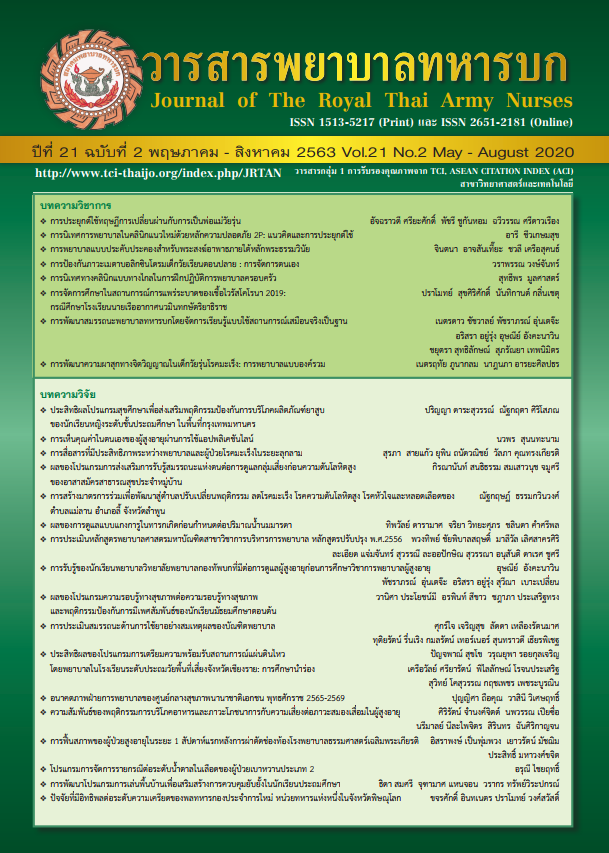Effects of Using the Adaptation Enhancing Program on Depressive Symptoms among Nursing Students
Keywords:
Adaptation Enhancing Program, Depressive Symptoms, Nursing StudentsAbstract
Nursing Students need to cope with several aspects affecting their mental health issues, especially depressive symptoms. Therefore, providing them the adaptation enhancing program could reduce depressive symptoms among nursing students. The purpose of this quasi-experimental study was to examine effects of using the adaptation enhancing program on depressive symptoms among nursing students at Boromarajonani College of Nursing, Phra-phutthabat (BCNPB). Samples were 36 first year nursing students. Eighteen nursing students were randomly selected in the experimental group participating in the adaptation enhancing program. There were 6 weeks of 60-90 minutes session per week. Whereas, other 18 nursing students in the control group participating in the standard-college program. The CES-D inventory was used to collect data at pre-post test and one month follow-up. Reliability was 0.82. Descriptive statistics, independent t-test, two-way repeated measures ANOVA, and multiple comparisons by bonferroni were employed to analyze the data.
The results of this study were as follows:
- After completion of the adaptation enhancing program, participants in the experimental group had significantly lower mean scores of depressive symptoms than the control group at the post-test (p < .01) and 1 month follow-up period (p < .001).
- In the experimental group, mean scores of depressive symptoms at pre-test, post-test and 1 month follow-up were significantly different (p < .001).
From the study results, it showed that this adaptation enhancing program could decrease depression among first year students. Therefore, nursing instructors could apply this program in order to reduce depressive symptoms among nursing students in other institutes.
Downloads
References
Huang CY, Sousa VD, Tu SY, Hwang MY. Depressive symptomsandlearnedresourcefulnessamong Taiwanese female adolescents. Archives of Psychiatric Nursing 2005;19(3):133-40.
Song SJ, Ziegler R, Arsenault L, Fried LE, Hacker K. Asian student depression in American high schools: Differences in risk factors. Journal of School Nursing 2011; 27(6):455-62.
Perera B, Torabi MR, Jayawardana G, et al. Depressive symptoms among adolescents inSri Lanka: Prevalence and behavioral correlates. Journal of Adolescent Health 2006;39(1):144-46.
Reangsing C. Predictive Factors Influence Depression among Secondary School Students, Regional Education Office, Chiang Rai Province. Thai Journal of Nursing Council 2011;26(2):42-56. (in Thai)
Santrock JW. Adolescence. New York: Mc Graw-Hill Education; 2014.
Townsend MC. Essentials of psychiatric mental health nursing: Concepts of care in evidence-based practice. 6thed. Philadelphia: F. A. Davis; 2014.
Lotrakul M, Sukanit P, editors. Ramathibodi’s Essential of Psychiatry. 4thedition. Bangkok: Faculty of Medicine Ramathibodi Hospital; 2015. (in Thai)
Furegato AR, Santos JL, Silva EC. Depression among students from two nursing undergraduate programs: self-assessment on health and associated factors. Revistra Brasileira de Enfermagem 2010;63(4):509-16.
Grazziano ES, Bianchini C, Lopes LF, Souza BF, Franco DM. Resistance to stress and depression in students of nursing technical courses. Journal of Nursing UFPE on line 2015;9 (Suppl.2):837-43.
Chen CJ, Chen YC, Sung TC, Hsieh, TC, Lee MS, Chang CY. The prevalence and related factors of depressive symptoms among junior college nursing students: A cross-sectional study. Journal of Psychiatric and Mental Health Nursing 2015;22(8): 590-8.
Kaewmart N, Koedbangkham J, Nabkasorn C. Factors Influencing Depression among Nursing Students of Burapha University. The Journal of Faculty of Nursing Burapha University 2011;19(Suppl.2):83-95. (in Thai)
Beck JS. Cognitive therapy: Basics and beyond. 2nd ed. New York: Guilford; 2014.
Lauboonthawatchai A. Mental Health and Psychiatric nursing. 5thed. Chulalongkorn Printing Office; 2013. (In Thai)
Downloads
Published
How to Cite
Issue
Section
License
บทความหรือข้อคิดเห็นใดใดที่ปรากฏในวารสารพยาบาลทหารบกเป็นวรรณกรรมของผู้เขียน ซึ่งบรรณาธิการหรือสมาคมพยาบาลทหารบก ไม่จำเป็นต้องเห็นด้วย
บทความที่ได้รับการตีพิมพ์เป็นลิขสิทธิ์ของวารสารพยาบาลทหารบก
The ideas and opinions expressed in the Journal of The Royal Thai Army Nurses are those of the authors and not necessarily those
of the editor or Royal Thai Army Nurses Association.






